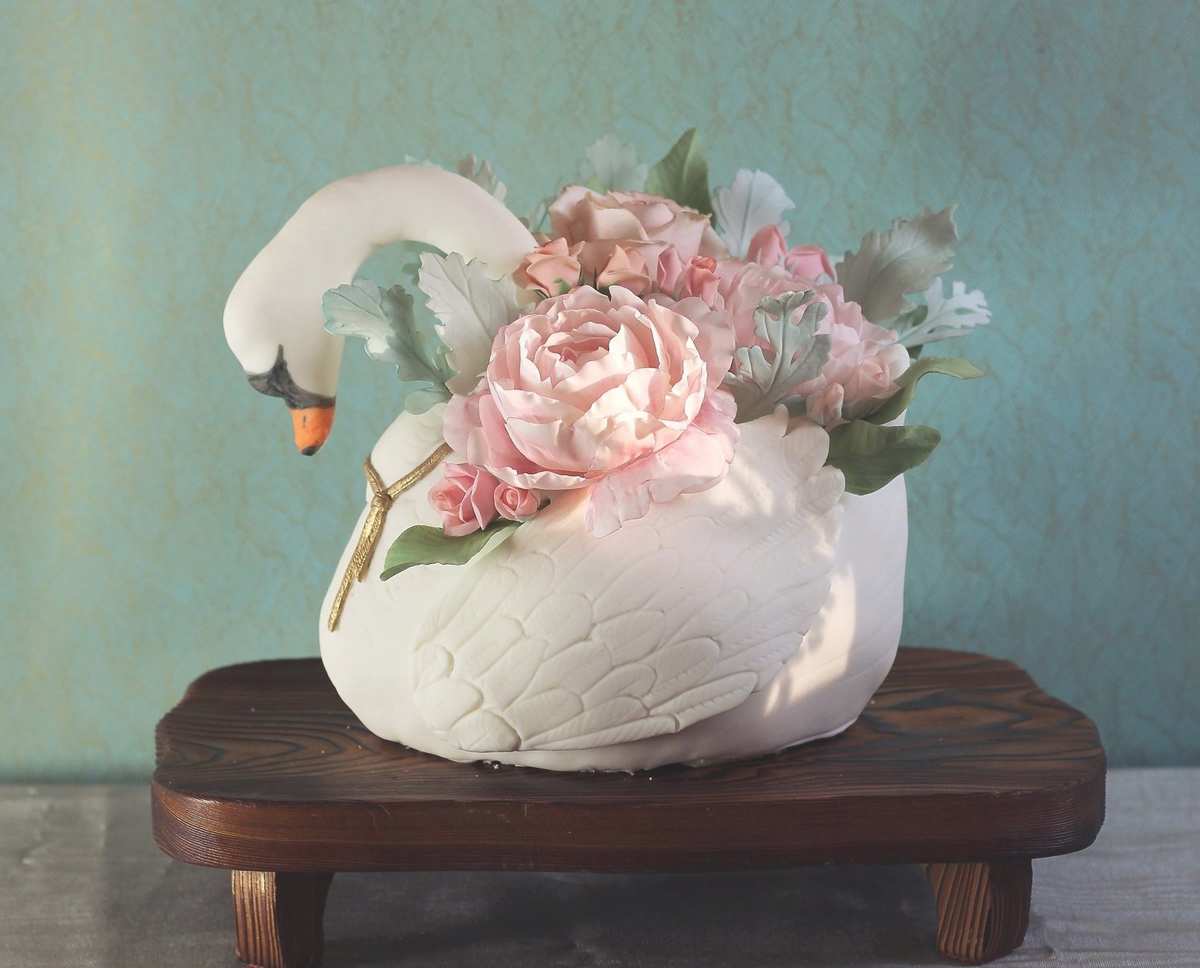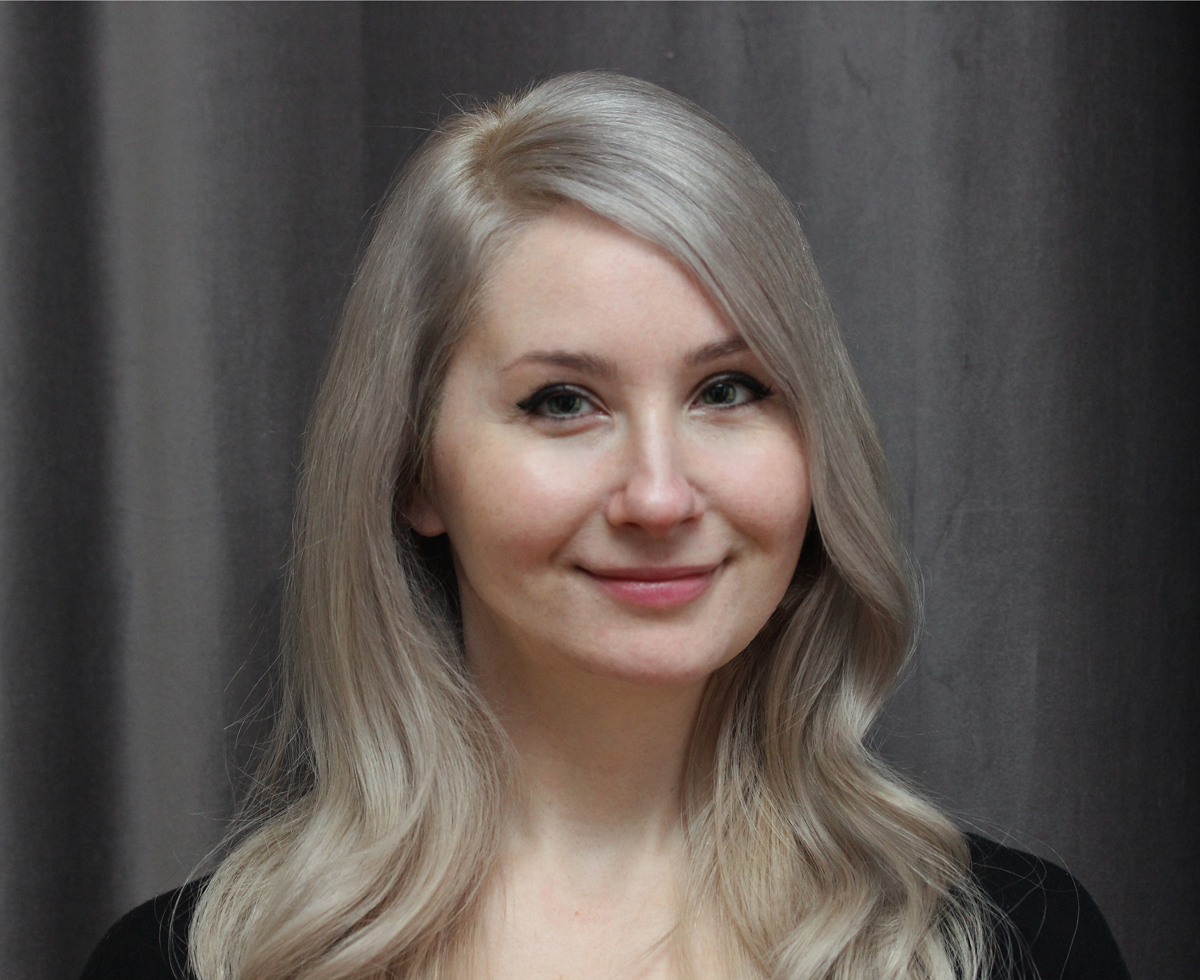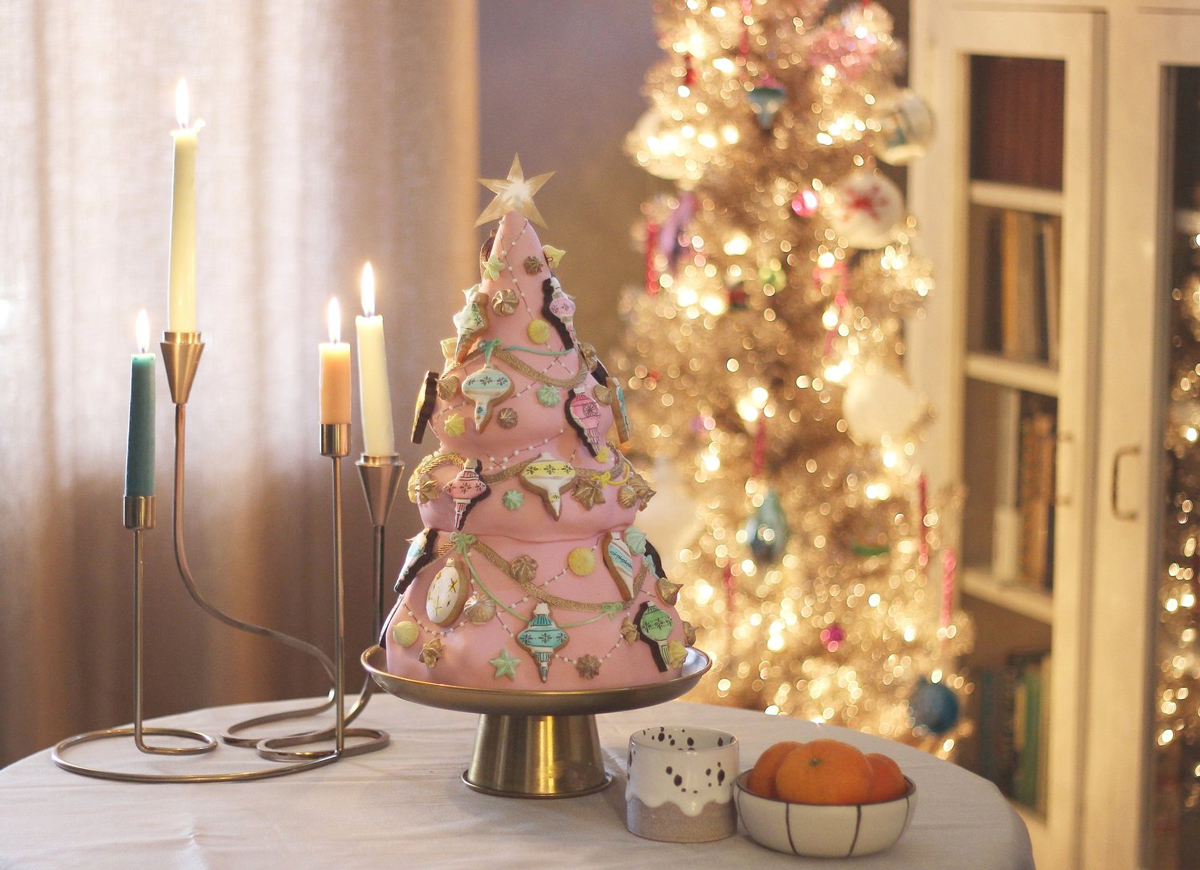
Photograph courtesy of Molly Brodak
A three-dimensional swan, a lemon pepper-flavored portrait of Killer Mike, and six near-identical cookies decorated likes mermaids complete with iridescent golden seashell bras—these are just a handful of the creations Molly Brodak has whipped up in her kitchen this year. As if being a Kennesaw State University professor and successful writer (she’s penned an award-winning book of poetry and an acclaimed memoir) weren’t enough, Brodak has taken her sweet tooth to another level as a contestant on this season of ABC’s the Great American Baking Show.
Born outside of Detroit, Brodak moved to Atlanta from Augusta in 2011 after being awarded a two-year fellowship at Emory University. These days, she and her husband (writer Blake Butler) live in Ormewood Park in a backyard bustling with Polish chickens—she also chronicles her baking endeavors on her blog, Kookie House. Earlier this year, on a whim, Brodak applied to be a contestant on the stateside adaptation of the wildly popular Great British Bake Off. After a grueling process, she and nine other contestants were flown to Berkshire England this past September. Below, she talks to Atlanta magazine about baking as escapism, how it’s served her writing career, and the surreal experience of seeing yourself on TV.

Photograph courtesy of Molly Brodak
What’s the first thing you remember baking?
I was raised by a single mom and was alone a lot in the kitchen—I would just fend for myself. It was always a place of total freedom to me. I distinctly remember one time I took all the candy that I had in the house and threw it in a saucepan and tried to bake a candy out of all the candies that I had. It was horrible and burnt. I ruined the saucepan and my mom was really mad at me. I was never properly trained; I started baking seriously when I moved to Atlanta after I got my poetry fellowship at Emory. I didn’t know anyone, and I had a lot of time on my hands.
Was there a moment or experience that convinced you to become serious about baking?
In [December] 2012, everyone was talking about how there was going to be an apocalypse. It was some fake Mayan prophecy, like the world was going to end. I made “apocalypse shortbread” or something and brought it into Emory to give to some of my colleagues. That was probably the first time I was like, “Oh, okay. I can do this.” Baking is something that people respond to positively, and it helped me connect to people. I was really shy, and it gave me a way to approach people and be friendly in a less awkward way. That was a turning point for me.

Photograph courtesy of Molly Brodak
What drew you to baking over other cooking methods?
I think if you are a baker you have to just love sweets. I don’t think you get into it unless you genuinely just want to eat candy all the time, which is me. I love sweets, and I just wanted to bake the thing that I had the craving for. That was a big part of it, but also, it just seems more joyful than regular cooking.
There was something so serious and off-putting about the whole chef and kitchen culture that seemed kind of aggressive and male-dominated and ego-driven, whereas baking seemed to be fun and lighter. I was more drawn to that tone. I worked in kitchens when I was younger—my first job ever was working in sort of a fancy restaurant, doing prep. I liked the fact that at the end of the meal you would bring something out that was sweet and meant to make you happy. It wasn’t there to fill your stomach. That seemed nice to me, like less pressure.
You’re a self-taught baker. How do you master new techniques for your creations?
The internet is something that is unprecedented in how you can use it to teach yourself things. I would watch a lot of YouTube tutorials on how sculpted cakes were made or how people worked with fondant or made gum paste flowers. You just experiment and try to figure it out.
I spend a lot of time thinking, “What if I did this,” and in between classes in my office I would sketch things out or just visualize it. I made a cake that’s shaped like a swan. I actually brought a version of that cake to my audition for [The Great American Baking Show]. I remember looking at it at one point objectively when they were taking pictures of it like, “Wow.” There was no swan cake tutorial. I pictured what I wanted and I made it. It was cool going to the auditions for the show because it shined a light on what I was doing in my kitchen privately and made me feel like I had something there. That was such an encouraging thing.

Photograph courtesy of Molly Brodak
How did you come to audition for the Great American Baking Show?
I have a friend who works in the film industry, and she mentioned on Facebook that the auditions were open. I always watched the show, and I thought, “I could do that.” I filled out this online form very quickly, not thinking too much about it or taking it that seriously. The audition process was really long and there were a lot of rounds. After the form, I did a Skype interview, and then they had auditions in Atlanta at a hotel with hundreds of people. From there they did auditions in New York City where they flew out 20 or so people, and we had to bake on camera in this kitchen. Then they narrowed down to the final 10. The process was like three or four months long.
What did the live auditions entail?
We had to bring a baked good to the audition in Atlanta—it could be anything you wanted. I brought the swan cake. You had to bring things that showed range. I brought the swan cake and then I brought palmier cookies that showed how I can do a classical French puff pastry. For the third thing, they gave everybody the same bread recipe. You had to come with this bread, and everyone was judged across the board on their bread. For the New York audition, you had to bring cookies. I had to fly with these cookies sitting on my lap, and they had to be identically decorated. I made these mermaid cookies and they all broke by the time I got to New York City, but I guess it wasn’t a big deal because they cast me anyway.

Photograph courtesy of Molly Brodak
Are you a fan of The Great British Bake Off?
Oh, definitely. I was obsessed with it, it’s such a great show. The American version gets compared to the British version a lot, which I understand. The one thing I didn’t understand about the comparisons was that the contestants on the British show were baking and then going home for the week. We were in a foreign country [the Great American Baking Show is filmed in the UK] with all this different equipment, different ingredients, and we baked on a really tight schedule. We would film one episode over two days, have a day off, and then start again. We were all tired and stressed out and not as comfortable on the show.
It’s just a different experience. The butter is different and the flour is different and we weren’t allowed to have the flour we wanted. I didn’t know what a difference it would make to have different flour or to use a convection oven, which I’d never used before. It was disorienting in many ways. Baking is so much about precision, so that was stressful.
Patience seems to be a huge part of baking. Do you consider yourself inherently patient?
Absolutely. I think the number-one quality you have to have as a baker is patience. I think I was born pretty patient. Paired with patience, something that you develop more is humility. You have to obey your ingredients. You have to do what the butter wants. You can’t control it in a way that you think you can. You have to put your own ego below your materials. If you mess up you have to be humble enough to start over. That’s something I developed as I baked more and more. It does take a long time to make these things. I’ll test a recipe dozens of times before I’m happy with it, and that’s something that definitely takes patience.
You’ve been quoted as saying baking is “a loss of self” for you—what does that mean?
As a writer, I think so much writing is about mining your experiences or letting your ego do what it wants. It’s writing about your consciousness and your subjective interaction with the world, and baking for me is such a complete 180 from that. I really need that balance, and I don’t know how other writers do it. Maybe they do woodworking or something. You need to be able to forget about your ego and yourself for a while, and that’s what baking does for me. I’m totally focused on the cake or the thing that I’m making, and I’m not thinking about who I am or my story. That’s part of why I like doing both. I don’t think I could just quit writing and open a bakery or vice versa. I think I really need that balance of both. They make me sane.
What’s next for you as both an accomplished writer and baker, I bet you have a fantastic cookbook in you.
I definitely want to do a cookbook someday. I think I need a lot more time for that though, because it just takes such a long time to develop recipes I’m happy with. I would say that’s years out, but that is for sure going to happen some day. In the short term, I’m going to Poland this summer to write another nonfiction book that’s kind of a followup to my memoir [Bandit]. I’m going to reconnect with my roots and write about some of the stuff that’s going on over there regarding race and the far right. I am super excited about that.
The show is airing now—is watching it a surreal experience for you?
Now that I’m watching it I still can’t believe that I got on the show. It still just feels like a complete dream. I don’t know when the point comes when I accept [that it actually happened]. It was crazy to be in that tent, the same tent where they film The Great British Bake Off. It was like walking around in a dream.













